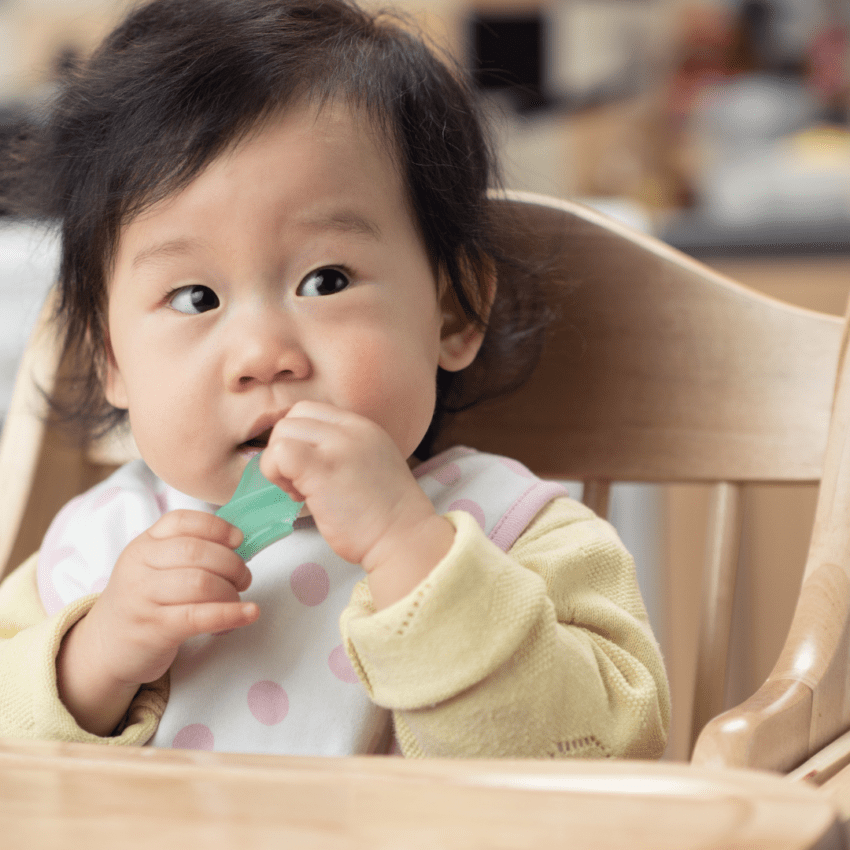After just a few months into your infant’s life, you may feel like you have a routine down- feedings, naps and playtime all well timed. All of the sudden, your little one is sleeping less, drooling and crying more. What’s happening?! Oh wait, they must be teething! Now what?
Here’s some teething info and a few tips to prepare for what is sometimes referred to as the “teething blues”:
When will my baby get his/her first tooth?
Most babies will get their first tooth around 6 months, but as with all developmental milestones, there is a range. Some children will start teething as young as 4 months and others won’t sprout a tooth until around 15 months! However, the American Academy of Pediatric Dentistry (AAPD) recommends visiting your pediatric dentist if your child hasn’t gotten their first tooth by 18 months. As a general rule, girls tend to get teeth earlier than boys and the pattern of teething timing tends to be hereditary too.
Which teeth come in first? When will my baby finish teething?
The first teeth to erupt are the bottom front two followed by the top front two. You’ll find that the teeth often erupt in pairs so the tooth on the right side will erupt at the same time as its complement on the left side. Babies will continue teething until 2.5-3 years old and will end up with a grand total of 20 baby teeth! Not to worry, this doesn’t mean you will be dealing with teething symptoms continuously for 2-3 years because not every tooth will cause distress when it erupts. In fact, research shows that teething discomfort peaks when the front teeth come in and decreases as the back teeth erupt. So you can rest easy (literally!) knowing that teething will not cause 2-3 years of sleepless nights.
What are some common teething symptoms?
The most common symptoms of teething include increased drooling, biting on hard objects, rash on cheeks, sleep disturbances, gum swelling, and soreness and general crankiness. A slight rise in body temperature can be seen, but a persistent fever (>101F) is unlikely to be related to teething. According to a few studies, teething symptoms tend to start 1-2 days before the tooth comes in and stop a day or two after the tooth erupts. If your baby has a fever, diarrhea, or doesn’t sleep through the night for weeks, it’s not likely to be related to teething and it would be a good idea to consult with your pediatrician.
How to help relieve my baby’s teething blues?
- Grab a fun teething toy – Solid or plush teething toys that are made from safe materials are the teethers of choice. Be sure to throw them in the refrigerator to cool for some extra soothing effects. Avoid the toys filled with the gels or liquid since you baby can gnaw through them and swallow some of the unknown fluid inside. Here are some popular choices:
- Massage your baby’s gums with a clean finger. If your baby already has a couple of teeth, be cautious to keep your fingers on the gum pads so you don’t get chomped on!
- Use a cooled washcloth– Try wetting a washcloth with water or breast milk and let it cool in the refrigerator. You can then use it to rub your baby’s sore gums or simply let them gnaw on it.
- Chilled foods in a mesh feeder– For children under 6 months who should be exclusively breast or formula fed, try freezing breast milk or formula in an ice cube tray and give it to your baby in a mesh feeder. For children over 6 months who have begun transitioning to solids, you can put chilled fruits or vegetables in the mesh feeder for a similar effect.
- Mild pain relievers– If the teething pains seem intense and are preventing your baby from getting a good night’s rest, consider using mild pain relievers such as Tylenol. If you are unsure about the proper dose, please consult with your pediatrician or pediatric dentist before giving it to you little one.
What teething remedies should I avoid?
- Teething gels and tablet containing benzocaine or belladonna (such as Anbesol, Orajel, or Hyland’s Homeopathic tablets) due to the potential negative side effects
- Amber teething necklaces should be avoided since they can pose a strangulation risk or can be a potential choking hazard
Stick to the remedies mentioned above and your baby’s teething needs should be covered! If you have any questions or concerns regarding teething or you are looking for an Upper West Side pediatric dentist for your baby, do not hesitate to contact our office!



